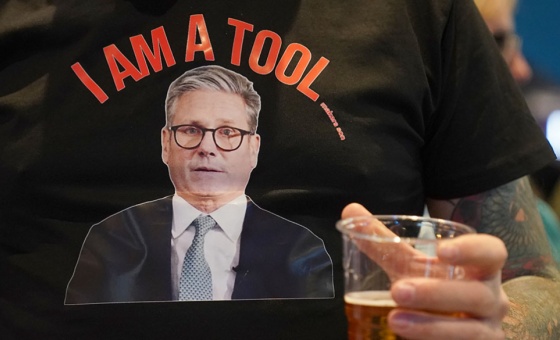This is the last article you can read this month
You can read more article this month
You can read more articles this month
Sorry your limit is up for this month
Reset on:
Please help support the Morning Star by subscribing here
OVER the past few weeks hundreds of thousands in Hong Kong have protested against the proposed introduction of a global extradition Bill. The largely peaceful demonstrations filled the front pages and the airwaves of the Western corporate media.
Western news outlets unquestioningly repeated the inflated figures of one and two million provided by the organisers, the Civil Human Rights Front, ignoring more objective estimates by local academics.
While the figures are more likely to be around 20 per cent of the headline figures, the fact remains that a huge number Hong Kong citizens took to the streets to voice their anger and concern.
Hong Kong’s chief executive Carrie Lam has postponed the proposals indefinitely. It’s possible they may be withdrawn entirely, although her own future is also in question.
Later events took a more ominous turn. Ultra-radical demonstrators, associated with the “localist,” or Hong Kong independence movement, laid siege to government buildings, harassing staff and members of the public, as well as the central police headquarters, with the aim of making the city ungovernable.
On July 1, the anniversary of Hong Kong’s return to Chinese sovereignty, masked rioters stormed the Legislative Council (Legco) building, raising the British colonial-era flag and vandalising anything they could lay their hands on.
The events were broadcast live on Hong Kong TV and their repercussions on Hong Kong public opinion will determine the direction of the crisis over the coming weeks.
Previously, on June 26, ultra-radical protesters marched to the city’s US consulate carrying signs pleading: “President Trump: Please Liberate Hong Kong.”
According to the Guardian, a protester then read from a letter handed to US diplomats in which the protesters petitioned the Great Orange Liberator: “In desperation we seek your engagement and assistance to fight back against this authoritarian regime with us.”
Protesters then made similar appeals at the consulates of the European Union, Australia, Canada, Russia and to Hong Kong’s two former colonial occupiers — Britain and Japan.
Attempts were made to make Hong Kong a central discussion point at the G20 summit in Osaka, Japan.
To the unwary reader or viewer in Britain, the cause of the protests was simple. China was seeking to impose a law that would allow it to extradite dissident voices and have them bundled off to the mainland where they would be almost automatically convicted. The protesters’ main slogan “No extradition to China,” emphasised this.
The proposed extradition Bill has been subject to an astonishing level of disinformation by its opponents in Hong Kong and overseas.
Despite its open international status, Hong Kong currently has extradition treaties with just 20 countries.
The Bill was meant to standardise the legal process by which fugitives could be returned to territories in which their alleged crimes were committed.
This involves more than 100 additional jurisdictions worldwide. But the campaign focused on just one, mainland China.
Ironically a number of the existing 20 territories have dubious human rights records and histories of using legal camouflage to persecute political critics — countries such as Singapore, Malaysia, Sri Lanka and the Philippines.
In the latter case, “fugitive offenders” includes a provision for Filipina women to be extradited for “offences relating to the unlawful termination of pregnancy” — an outrageous clause that simply hasn’t figured at all in extradition debates.
The proposed Bill would have limited extradition to China, or any other territory, on multiple grounds:
- The crime must have been committed within the jurisdiction of the requesting country, not within the Hong Kong Special Administrative Region.
- It must be a crime which is also considered an offence under Hong Kong law too.
- Extradition for overtly political or religious reasons is expressly prohibited.
- There must be no question of the crime being a disguise for secondary charges related to political or religious “crimes.”
- The minimum sentence for the crime must be at least seven years, ruling out all but the most serious categories.
- Those facing extradition must have the grounds for their deportation investigated and confirmed by a Hong Kong court. They also have the right to appeal.
Despite the protesters’ claim that Hong Kong is an oasis of the “rule of law,” they effectively discount the role of Hong Kong’s own judiciary, whose higher echelons are often staffed by Western judges — British, Canadian and Australian.
Grenville Cross, a British lawyer, who is vice-chairman of the senate of the International Association of Prosecutors and was Hong Kong’s director of public prosecutions from 1997 to 2009, writing in the South China Morning Post, noted that the discussions on the extradition anomalies had taken place as far back as 1998, without any progress, so Beijing has hardly railroaded this proposal through.
Cross noted: “A vacuum therefore exists in law enforcement between the various parts of China, from which only fugitives have benefited. They have found a safe haven in Hong Kong, whose reputation has suffered.
“However, Hong Kong has been able, since reunification, to secure the return of an estimated 200 criminal suspects from the mainland through informal channels, although it has not been able to reciprocate.”
Far from being pushed by Beijing, which after all has had 30 years to impose such legislation, it appears that the fiasco was largely home-grown.
According to a South China Morning Post report of June 29 (Has Carrie Lam lost Hong Kong in her bid to push through extradition Bill?) Hong Kong chief executive Carrie Lam’s decision to plug the gaps in Hong Kong’s existing law was motivated by the outrage over the inability to extradite a young Hong Kong man Chan Tong-kai, to the island of Taiwan where he had strangled his pregnant girlfriend 19-year-old Poon Hiu-wing.
He stuffed her body in a suitcase, dumped the case on the outskirts of Taipei, then stole her iPhone and money from her account using her ATM card.
Although he has admitted to the killing, Chan could only be charged in Hong Kong courts with illegal money-laundering, the crime he committed on Hong Kong soil, not for the killing outside the HKSAR’s jurisdiction. He was jailed for just 29 months.
Nonetheless Lam and her advisers have clearly botched the legislation. As a lifelong civil servant, Lam appeared oblivious to the opportunity this would present to anti-Beijing forces inside and outside Hong Kong.
These are vehemently opposed to any process, political, economic or cultural, that brings Hong Kong and the mainland closer together.
There is, in fact, a politically charged extradition case before the Hong Kong courts right now.
It involves Ramanjit Singh, a Hong Kong permanent resident of Punjabi origin who is currently fighting extradition to India.
The charges against him include assisting a jail break in India. His defence is that he was briefly a political activist with a Khalistani separatist party in Punjab and the Indian government’s charges are fabrications masking political persecution and that he faces further torture and persecution if he is returned.
One might have thought Singh’s case would have become a cause celebre, however since the defendant is a brown-skinned Hong Konger and the case offers no opportunity to demonise China, his case has gone unchampioned.
Not that Chinese authorities should escape criticism. Their often heavy-handed pursuit of suspects adds fuel to the fire.
In late 2015, a dragnet arrested five men involved a shadowy Hong Kong publisher called Mighty Current, which specialised in salacious gossip books about mainland Chinese politics.
While legal in Hong Kong, the books were banned in the mainland and were distributed clandestinely inside Guangdong province, where a number of the men had second homes.
While some arrests took place inside the mainland, in two cases there was a clear suspicion that the men had been taken into the mainland by rendition, one in Thailand and the other inside Hong Kong itself, in violation of the Basic Law.
These are claims dismissed by the Chinese government but they certainly contributed to a climate of deep distrust that the anti-extradition campaigners successfully built upon.
The mishandling of the protests by Lam’s team has also created divisions among the self-styled “patriotic” camp.
Some political leaders have urged Lam to drop the legislation while others, notably among the Federation of Trade Unions, are furious at what they see as Lam’s failure to consult them over her volte face.
One of this camp’s most respected spokesmen, Jasper Tsang, a former president of Hong Kong’s Legislative Council, and former chairman of Hong Kong’s largest party, the Democratic Alliance for the Betterment of Hong Kong, told Bloomberg TV that in his opinion: “There are very clear safeguards against arbitrary surrendering of so-called fugitives.”
However, he argued that confidence in the mainland’s judicial system was very low among many Hong Kong people.
“Lam and her administration have missed a few, very critical chances to solve the problem, to defuse the situation.”
How far any kind of short-term compromise is possible is difficult to determine, since the opposition scents blood and has sought direct Western intervention in the dispute.
As we will see in a future article, Hong Kong is becoming a geopolitical battleground and the extradition issue has been weaponised masterfully.











